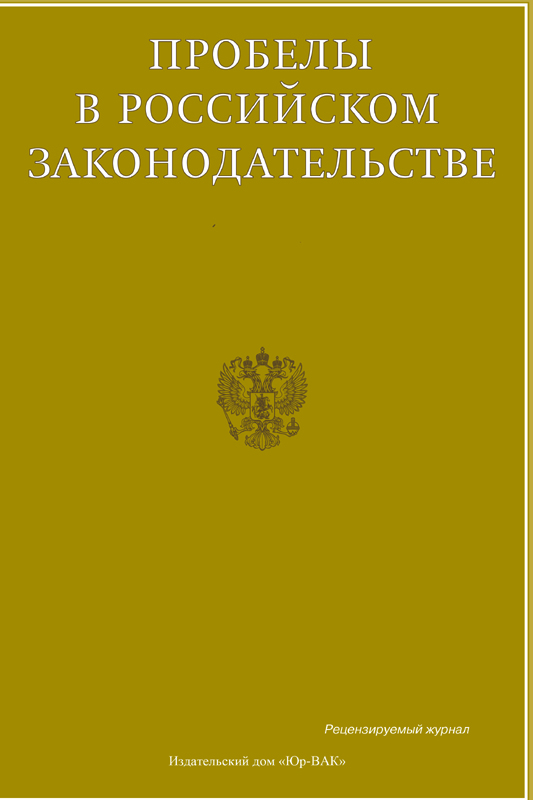The History of the Formation and Development of Mythologemes in Philosophical and Right-Wing Thought About Artificial Intelligence
- Authors: Kiselev A.S.1,2, Barkova A.V.2
-
Affiliations:
- Moscow State Regional University
- Financial University under the Government of the Russian Federation
- Issue: Vol 15, No 7 (2022)
- Pages: 15-21
- Section: Articles
- URL: https://journals.eco-vector.com/2072-3164/article/view/531783
- ID: 531783
Cite item
Abstract
The article discusses the main milestones in the development of artificial intelligence (AI), provides definitions of artificial intelligence, including from Russian legislation. Examples of domestic and foreign legal acts regulating the development, activity, and use of AI are given. Special attention is paid to the "National Strategy for the development of artificial Intelligence for the period up to 2030". The problems of legal regulation of AI are considered. The purpose of this work is to search for the origins of mythologies about artificial intelligence in the XX century, their impact on society, on philosophical and legal thought. Taking into account the novelty of the idea, the article also examines the views of modern scientists on the future of artificial intelligence. Conclusions. In the near future, artificial intelligence will take an increasingly strong position in fundamentally important spheres of public life: in the management of the economy, the state, weapons, in the dissemination of information and political struggle, etc. All this poses a task for lawyers: to create legal norms regulating fundamentally new social relations, because artificial intelligence not only changes existing relations, but also creates new opportunities for illegal activities. Domestic legal scholars believe that it is necessary to introduce terms and norms related to AI into the Civil Code, because this would clarify a wider range of legal norms related to AI. However, to do this, it is necessary to solve a number of not only legal, but also philosophical and legal problems. The main issue here is the question of the legal personality of AI. In what form the legal subjectivity of artificial intelligence will be adopted by legislators will, among other things, depend on the technical capabilities of specific AI samples. The second issue of legal regulation of AI is who will be responsible for the implemented incorrect, dangerous, or illegal solution proposed and executed by artificial intelligence: the robot itself, its manufacturer, owner, or operator. Global challenges in 2020-2022 have pushed the development of such promising technologies as AI into the background: state structures of developed countries are forced to solve current urgent problems. But even now we can confidently say that the issues of AI development and the relevant law will remain on the agenda of the most developed countries in the coming years. Despite the fact that governments of different countries are trying to guide the development of AI with the help of special legal acts, the leading role here still remains for the development of technology. And the technical trend is obvious: in the coming years, universally used "smart robots" will become a reality in developed countries.
Full Text
About the authors
Alexander Sergeevich Kiselev
Moscow State Regional University; Financial University under the Government of the Russian Federation
Author for correspondence.
Email: alskiselev@fa.ru
Cand.Sci.(Law), Associate Professor of the Department of Civil Law, Faculty of Law, Institute of Economics, Management and Law; Senior Lecturer, Department of International and Public Law, Faculty of Law Mytishchi, Moscow Region, Russian Federation; Moscow, Russian Federation
Alina Vasilyevna Barkova
Financial University under the Government of the Russian Federation
Email: avbarkova@fa.ru
Cand.Sci.(Law), Senior Lecturer of the Department of Legal Regulation of Economic Activity of the Faculty of Law Moscow, Russian Federation
References
- Kiselev A.S. On the need for legal regulation in the field of artificial intelligence: deepfake as a threat to national security // Bulletin of the Moscow State Regional University. Series: Jurisprudence. 2021. No. 3. Pp. 54-64.
- Kitov A.I. Electronic digital machines and programming. - M.: Fizmatgiz, 1956. - 295 p.
- Krysanova N.V. Legal issues of artificial intelligence // Russia: trends and development prospects. 2021. No. 16-1. pp.586-589.
- Krysanova-Kirsanova I.G., Trushina I.O. Legal status of artificial intelligence // Bulletin of economic security. 2022. №2. pp. 104-107.
- Minbaleev A.V. Problems of regulation of artificial intelligence // Bulletin of SUSU. Series: Law. 2018. No. 4. pp. 82-87.
- Safronov A.V. Bureaucratic and Technological Limitations of Planning Computerization in the USSR // Economic Policy. 2022. №2. pp. 120-145.
- Explanatory Dictionary of Artificial Intelligence / Authors-compilers A.N. Averkin, M.G. Gaaze-Rapoport, D.A. Pospelov. M.: Radio and communication, 1992. - 256 p.
- Turing A. Computing machines and mind / Alan Turing; [per. from English. K. Koroleva]. - Moscow: AST Publishing House, 2018. - 128 p.
- Chapek K. Rossum Universal Robots. 1920 [Electronic resource]. - Access point: http://lib.ru/SOCFANT/CHAPEK/rur.txt (date of access: 11/13/2022).
- Yastrebov O.A. Artificial intelligence in the legal space // Bulletin of the People's Friendship University of Russia. Series: Legal Sciences. 2018. №3. pp. 315-328.
- Kiselev A. S., Barkov A. V., Sokolov A. P., Grishina Y. S. On the Problem of Legal Regulation of Technologies with Elements of Artificial Intelligence // Smart Innovation, Systems and Technologies. 2022. Vol. 288. P. 45-51.
- Searle, John. R. Minds, brains, and programs. Behavioral and Brain Sciences. 1980. №3 (3). p. 417-457.
Supplementary files









